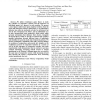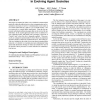31 search results - page 1 / 7 » Using a Social Orientation Model for the Evolution of Cooper... |
IAT
2010
IEEE
13 years 2 months ago
2010
IEEE
We utilize evolutionary game theory to study the evolution of cooperative societies and the behaviors of individual agents (i.e., players) in such societies. We present a novel pla...
ECAL
2005
Springer
13 years 9 months ago
2005
Springer
One of the greatest challenges in the modern biological and social sciences has been to understand the evolution of altruistic and cooperative behaviors. General outlines of the an...
ICDM
2007
IEEE
13 years 10 months ago
2007
IEEE
We present a machine learning methodology (models, algorithms, and experimental data) to discovering the agent dynamics that drive the evolution of the social groups in a communit...
MABS
2004
Springer
13 years 9 months ago
2004
Springer
Anthropologists have yet to adequately investigate the evolution of food sharing despite its prevalence among contemporary human societies. As an initial step toward rectifying thi...
GECCO
2005
Springer
13 years 9 months ago
2005
Springer
This paper investigates the effects of two different communication protocols within an artificial society, where communication and cooperation is necessary to survive. Communicat...


